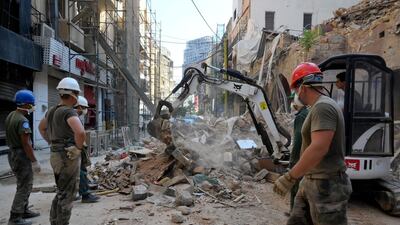Lebanon’s economy continued to deteriorate in September, following a devastating blast at Beirut’s port and as prime minister designate Mustapha Adib failed to form a new government and stepped down.
The BLOM Lebanon PMI index, a measure of the strength of the country's private sector, edged up slightly to 42.1 last month from 40.1 in August. A reading above 50 denotes economic expansion and one below 50 represents a contraction.
“After the August 4, 2020 blast, the Lebanese economy is trying to stand on its wobbly legs again, albeit with little success,” said Blom Bank chief economist Ali Bolbol.
“Notwithstanding the current corona epidemic, it is quite apparent that private sector fortunes will not turn around unless there is government reform and a recovery plan that take measures to restore confidence in the banking system and the exchange rate regime and to bring good governance to public administrations, aided by sizeable concessional funding from outside," Bolbol said.
"Unfortunately, the urgency of such a plan has yet to dawn on Lebanese politicians,” he added.
Squabbling among Lebanese politicians over who should appoint ministers to a new administration, specifically the finance ministry, led Mr Adib to step down in September, less than a month after he was nominated to form a fresh cabinet.
The country, which defaulted on about $31 billion of eurobonds in March, faces its worst economic crisis since its independence in 1943. Unemployment and poverty are on the rise. The Lebanese pound pegged at 1,507 to $1 since 1997, has lost more than 80 per cent of its value against the greenback on the black market. Following Mr Adib's resignation the Lebanese pound fell further to trade at 8,300 on the parallel market.
Meanwhile, inflation continues to soar, reaching an annual 120 per cent in August.
"The situation could further deteriorate and inflation rates shoot higher if the Banque du Liban stops subsidising the import of essential goods at the official exchange rate," Blom said in a separate statement. The central bank, BDL, has been covering imports of essential goods such as wheat, medicine and fuel oil since December 2019, eroding its foreign reserves.
A further decline in output at the end of the third quarter underpinned the downturn, with survey respondents blaming the slide in activity on the ongoing disruption related to the Beirut August 4 port explosion that killed at least 190 people and wounded over 6,000, as well as difficulties in securing US dollars.
With both domestic and foreign demand conditions being subdued, new export orders fell sharply and companies continued to cut their staff numbers in September, according to the survey. The rate of job shedding was modest and little-changed from August.
Meanwhile, input prices rose at a quicker pace in September, with companies passing on higher costs to customers, leading to an increase in average output prices.
“Looking forward, Lebanese businesses remained severely pessimistic towards the one-year business outlook,” the survey said. “Negativity was driven by fears that the ongoing liquidity crisis would persist even with the formation of a new government. Sentiment was at the joint-weakest since the survey's inception in May 2013.”
Lebanon’s economy rapidly deteriorated since protests erupted last October over corruption and the economic mismanagement of the country that has left it saddled with $94bn of public debt as of the end of July.
Talks with the International Monetary Fund about a $10bn bailout, which could trigger further pledges of investment that are dependent on the implementation of reforms, have stalled due to political wrangling.


